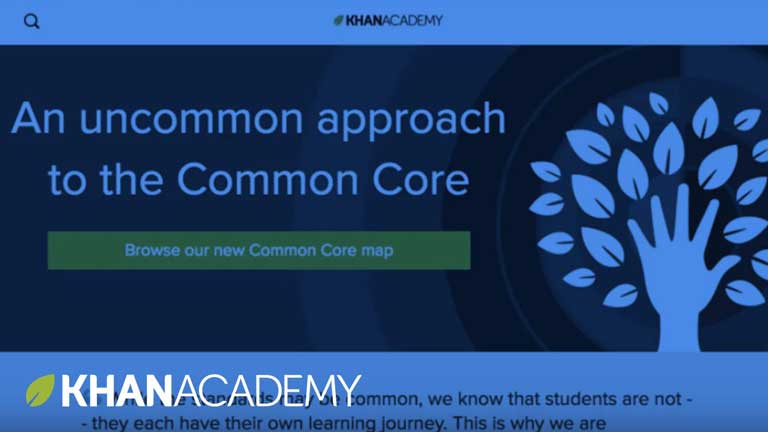Seven years ago, I had Kahn Academy slated as a near perfect mathematics curriculum for my sons, when they were ready. The testimonials of grade-schoolers doing college calculus were impressive. That they were doing so by watching videos at their own pace was all I needed to hear.
Then, something awful happened.
Sal Kahn Met Google, then Bill Gates
Not long after discovering Kahn’s videos, I saw him discussing “Innovation in Education” with Bill Gates.
What did Kahn have to learn from Gates about education? Gates had skipped out of college to become a billionaire. And his common core was failing miserably?!
In fairness to Kahn, the outcry against common core, introduced in 2010, was not yet nation-wide. At the time of their meeting in 2012, it was not the anti-endorsement of Gates for “innovation in education” it would soon become.
In retrospect, the co-opting of Kahn and his academy began in 2010 when he received $2 million from Google for creating new courses and translating content into other languages.
They Even Got Math Wrong
Ironically, the worst complaints about common core are in Kahn’s area of expertise: mathematics. Isn’t math the easiest subject to get right in a curriculum?
According to common core expert James Pesta, a professor at the University of Wisconsin, the curriculum:
- Changes math into writing and drawing. Instead of solving math problems, the students must draw circles, tubes, and squares to solve a problem.
- Takes the natural parts and makes them non-intuitive.
- Pushes exposure to algebra out to high-school from the usual start in 6th or 7th grade.
- Shifts the purpose away from getting the right answer to getting a group consensus on what the correct answer might be.
- Turns math into a subject for which even parents who are experts in math cannot help their children.
That’s great for kids who want to avoid math, altogether. But it’s a complete waste of time for kids that do.
Professor James Milgram, who did the calculations for the Apollo moonshots, explains why he wouldn’t sign off on common core math:
How could an expert in math like Khan, who’d made his reputation by helping grade-schoolers do college-level math, be fooled?
The Core of Common Core
In an interview on the Tom Woods show, Pesta says the unstated goal of common core is training parents to accept that only the state can teach their children, properly. Pesta also believes that common core is a vehicle for teaching children a one-sided ideological view:
Why else would they have children reading executive orders from President Obama and EPA tracts instead of the classics of literature?
The premise of Common Core, when you boil it right down, is that the state owns your kids, not you. And we all should be very worried about that.
Is Kahn’s Academy Salvageable?
It’s best to let Kahn speak for himself on whether his academy is a non-common-core alternative. Here’s Khan in 2013:
“…When we looked at the standards, when we looked at the items coming out of the assessment consortium, smarter balanced, we realized that this is a very very very good standard.”
“Right now, we have a team of teachers, of professors, of graduate students who are working closely with us, working very closely with many of the authors of the common core itself, to make sure that we intentionally create content that really hits at the conceptual spirit of the common core.”
Conceptual spirit, Sal?
Do you mean the “conceptual spirit” of forestalling algebra until high-school? The “conceptual spirit” of having children read presidential executive orders and EPA tracts instead of classic literature? The “conceptual spirit” of the most centrally federalized education scheme ever devised?
A popular question on Khan’s website is “Do you have content for non-Common Core users?”
After two paragraphs of stalling, the answer is:
Due to the small size of our content team, we don’t currently have the resources to pursue a curriculum alignment with non-Common Core standards.
2016 Update from Sal
“Now we have 150,000 exercises and many thousands of videos vetted by the authors of common core!”
Can I Trust You to be Alone with My Children?
Curriculums are best chosen the same way parents decide on a tutor. Trusting them to be alone with your children is a good start.
Would you trust a tutor who did any of the following to be alone with your child?
- Leaves gaping holes in essential subjects.
- Confuses them with lots of words when a simple answer will do.
- Uses methods that even expert parents don’t understand.
- Trains them on political agendas instead of teaching them the subject at hand.
Some accuse parents of using school as a babysitter. But, would even those parents hire a babysitter who behaved in such ways?
Failure to Who?
To parents that want the best education possible for their children, common core is a failure. However, it’s not a failure to Gates. His goals have little in common with those of individual parents.
Gates wants to impose “standards” on children, worldwide. Here he is admitting that doing so requires making a range of compromises that will hold many children back.
The uniform approach, sort of monolithic state-by-state approach that we have, yes that probably holds things back. But politically, to get that to change is very hard. I mean, charter schools at California shorts their charter schools in a way that most of them are are financially unstable right now. And, you know, the Union often are used for the status quo, whether it’s against charters or against personnel systems. So, it’s very very tough because everybody wants a minimum standard. And using a market-based approach you worry that you won’t hit that minimum and so you get these kinds of rigid approaches.”
That’s fair warning to all discerning parents. Common core cannot (and was not designed to) match the results of homeschooling or private schools. Neither must compromise with a union, take rigid monolithic approaches, or meet only minimum standards. All three of those “requirements” for Gates is tantamount to failure in a homeschool or private school.
Gates says that using a market-based approach makes him “worry that you won’t hit that minimum and so you get these kinds of rigid approaches.” Prior to his co-opting of Kahn, Sal’s market-based approach was mopping the floor with any educational innovation Gates had ever dreamed of. But, now he’s worried about turning education over to the market from which Kahn’s Academy emerged? This is either willful ignorance or another checkmark in the unqualified column for Gates on “innovation in education.”
Making Common Core Irrelevant
As tragic as it was to watch the co-opting of Salman Kahn and his academy, the work he began is being carried out by other teachers. Their classrooms are free of “rigid, monolithic, minimum” standards. And, the fruits of their market-based labor have already put any child with web access only a few clicks away from escaping Gate’s “innovations.”
Even with the many superior curriculums, already online, common core will not become irrelevant until parents become aware of them. They must also dare to walk away from so-called traditional models of education. Of course, referring to common core as traditional is like referring to an 8-year-old as a great great grandfather.
Outliers’ Perspective
Khan let his academy be co-opted by billionaires and “standards” with a regrettable “Conceptual spirit.” Thanks to other teachers who’ve taken up the work Kahn set out to do, the impact is minimal, if not zero.
Professor Pesta describes common core as “the most centrally federalized education scheme ever devised.” Unfortunately, states have a long history of injecting themselves into the arena of education. Aside from the Cathedral schools under Charlemagne in the early 9th century, state intervention in education has produced lackluster, and lately catastrophic, results.
Today, western civilization is still recovering from the Prussian model that replaced education with mere training. Common core takes the Prussian model and adds ideological indoctrination, the forestalling of exposure to essential subjects to early adulthood, and unnecessary confusion to straightforward subjects like math.
Remarkably, though still unvalidated or tested, common core consortiums managed to push their “standards” into the SAT college admission tests in 2016. Even parents dead-set against common core now believe they must go along with it lest their children are prevented from getting into college. This is false, but a topic for a separate essay.
The Solution is Yours
It is the responsibility of parents, not the state, to provide their children with an education. The shirking of that responsibility invites third parties into the mix.
Fortunately, all underperforming third parties can be disinvited if parents educate their children without relying on the state. That doesn’t necessarily mean doing it yourself but making it happen. If you can afford them, there are still excellent private schools “out there.” Alternatively, more curriculums arrive on the scene, every day.
Most property taxes are justified in the name of paying for local public schools. This will almost certainly mean forgoing the benefit of property tax money for the public schools your children will not be attending.
Update: After watching ~450 videos, I can wholeheartedly recommend three courses in the Ron Paul Homeschool Curriculum: Western Civilization I & II, and Government 1B. I’ll hold off on further recommendations until I’ve taken the course, personally. That also helps ensure my kids don’t get ahead of me, anytime soon!
BTW, those three courses are also available as bonuses when purchasing the “Master” level of Tom Woods’ Liberty Classroom.



